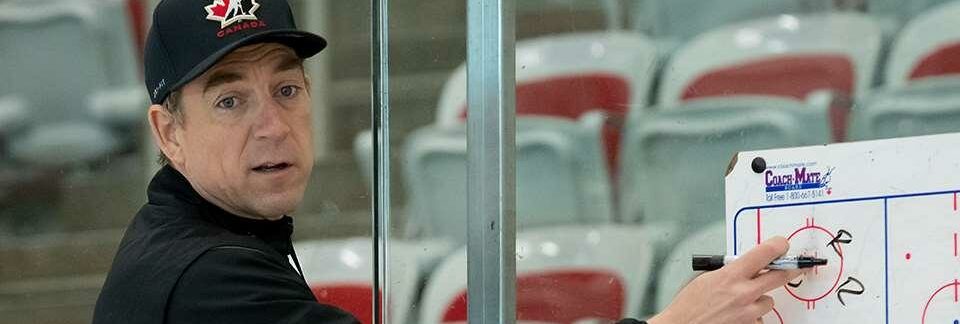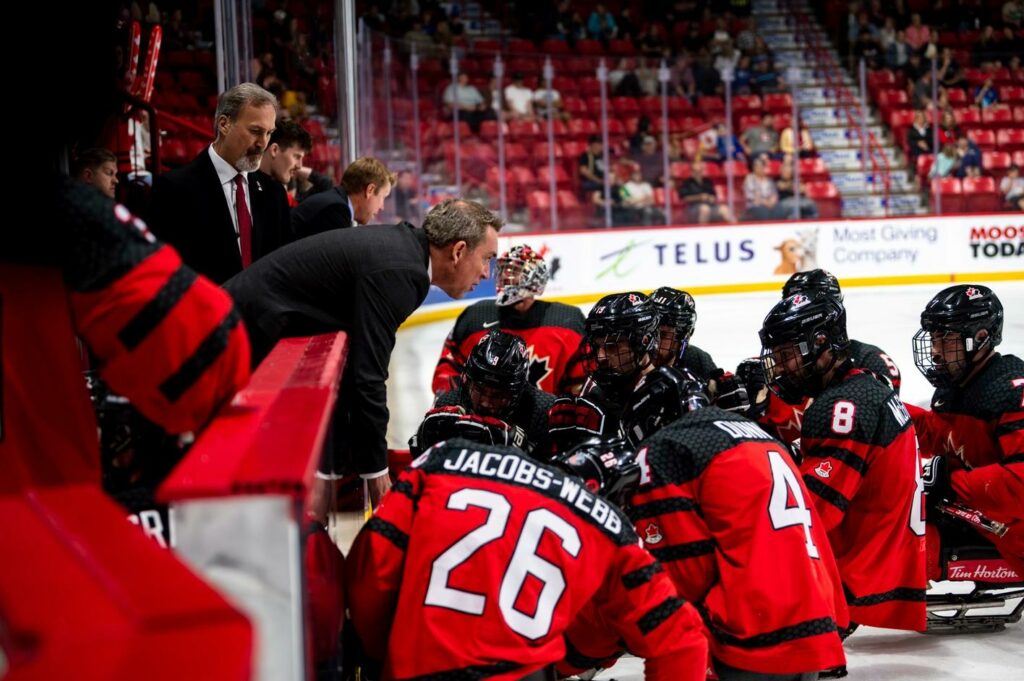
Russ Herrington has coached and won at various levels of hockey for close to three decades, having spent the past six as head coach of the York University Lions men's hockey team after serving as an assistant for two years.
Since joining the Lions staff, he's taken on a new coaching challenge in the world of para hockey with the Canadian national team.
First invited to guest coach the team in 2016, Herrington continued to be called on to join the coaching staff and moved from video coach to the bench as an assistant coach in 2019, and then became head coach in September 2022.

And, aside from a few minor differences – such as no backwards skating, bilateral skill sets (using both hands proportionately rather than one in the stand-up game) and the fact the players are on a sled – there aren't many discrepancies from the traditional game to the para game.
"In terms of tactics and the approach, I don't really treat these players any differently than the players at York," said Herrington. "They're high-performance athletes; they just sit in a sled rather than stand on their feet. So, other than a few minor tweaks in terms of defending the rush because they don't skate backwards, it's basically the same thing."
The biggest difference, perhaps, lies in the path of Herrington's para athletes as opposed to the ones he coaches with the Lions. From players with disabilities from birth to amputees to paralysis and more, the players' journeys are inspiring and unique, with many being relatively new to the game.
"What it has taught me is the importance of simplicity, repetition and language," Herrington said. "In hockey, quite often, you're trying to be multifaceted, trying to be good at 10, 15, 20 different things. We had that approach, but we would become jacks of all trades and masters of none, so let's simplify the game and streamline our focus and be pointed in our language. Let's try and be brilliant at three things and then we can worry about trying to be brilliant at a fourth."
While there have been great strides made in growing the game of hockey in certain areas, the para game has, in some sense, lagged behind, he said, stressing that while para athletes may do it differently, para hockey players are, indeed, hockey players.
"They're as able as anybody else," he said. "They're fiercely independent, they don't want pity, they don't want sympathy; they want to be treated like everyone else, and that's the way I approach it."
Herrington also said he views the game through a much broader lens in terms of accessibility than he did before entering the para hockey world.
"I look at rinks completely differently now," he said. "There are a lot of arenas I go in now and I'm like, 'This is a great facility, but we couldn't bring a para team here, and that's a shame.' So, it's really opened my eyes in terms of the need to make things more accessible."
Under Herrington's leadership, the Lions have made it a priority to broaden their knowledge and understanding of a variety of social issues, including Black Lives Matter, Pride and Truth & Reconciliation.
They also recently held their second annual Colt's Crusade game on Dec. 3 against the Western Mustangs, spotlighting seven-year-old para hockey player Colton Hagarty, whom Lion forward Michael Douglas met while serving the youngster and his family at a restaurant in Toronto. The Lions also co-ordinated an invitation to a national team camp in Elmira, Ont., where Hagarty was able to meet some of the athletes.
"A lot of the things we've done, especially coming out of the pandemic, have been collaborative ideas coming from our players," Herrington said. "Michael came to me and said, 'Hey, this is a kid that is trying to get into para sport; what can we do to get him involved?,' so we were really glad to be able to celebrate Colt."
The Lions head coach said that being leaders in social initiatives is a key component in the program's mission of providing a transformational student-athlete experience on and off the ice.
"That's one of the things I challenge our group to do, individually and collectively: to change the narrative around hockey," he said. "As part of the CROSS (character, respect, optimism, sacrifice, self-care) acronym, we talk about character, and that to us is the understanding that the true essence of a person is in their actions, behaviours and choices, not what their external appearance looks like.
"We can't change all of hockey culture; we can change our hockey culture and hope it starts to spread.… We need to be leaders in that space, and that's a challenge I'm thankful our players are willing to take on."
Herrington is currently with the Canadian para team coaching at the 2023 Para Hockey Cup in Quispamsis, N.B. The tournament began on Dec. 3 – International Day of Persons With Disabilities, an annual observance promoted by the United Nations since 1992. The Canadians have won the first two games of the preliminary round, beating China 4-1 and Czechia 3-0.
